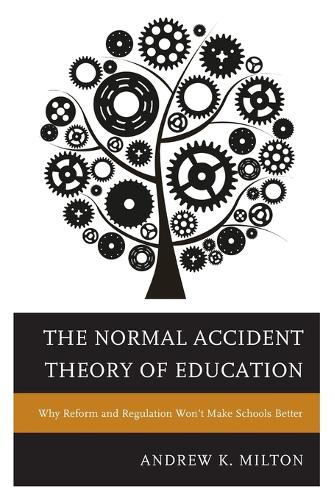
The Normal Accident Theory of Education: Why Reform and Regulation Wont Make Schools Better
(Paperback)
Publishing Details
The Normal Accident Theory of Education: Why Reform and Regulation Wont Make Schools Better
By (Author) Andrew K. Milton
Bloomsbury Publishing PLC
Rowman & Littlefield Publishers
1st April 2014
United States
Classifications
Tertiary Education
Non Fiction
370.1
Physical Properties
Paperback
146
Width 153mm, Height 227mm, Spine 11mm
236g
Description
Much of the current debate about education too often resembles the blind men describing an elephant--apprehending only a particular part of the situation or the process, many analysts tell an evocative but incomplete story. The so-called reform discussion proceeds with a lack of depth about the nuances and realistic limitations in the institutional order of school.
This book argues that as regulation of schools moves further up the bureaucratic hierarchy (first to state departments of education then to the national department of education) the legal and institutional requirements get more intensive but less concretely useful in class rooms. This bureaucratization serves to tighten the organizational environment, thereby increasing the risk of normal accidents. The increasing governmental management, in other words, makes it more likely that schools will fail to meet their goals.
Analyses of education are too often developed for public consumption in a fast-moving political world. This book examines some of the deeper organizational reasons why things dont work so well in school, as well as a look at some of things that do work. Most importantly, the book will explain how the social and cultural expectations of what schools can do may create unrealistic hopes. We, as a society, and schools, as institutions, embrace these unreasonably high hopes at our collective peril.
Check out Andrew's latest interview with Seattle Radio- http://kiroradio.com/listen/9972862/
Reviews
Andrew K. Milton presents a provocative analysis of the reasons that the accountability movement is doomed to failure, despite the unprecedented fanfare associated with its implementation. -- Walt Gardner, writer of Reality Check blog for Education Week
AT LAST, a teacher has explained why all the mandates, programs, and reforms handed down from on high (usually by a group less educated or skilled than the teachers themselves), really won't--can't improve education. -- Margaret Kirn, teacher, Puyallup, WA
This eighth-grade English teacher from Washington state explains why centrally mandated reforms on teachers, students and schools, imposed by federal and state governments, create unintended failures in complex public school systems. Reversing this trend, by giving teachers, parents and schools more flexibility and more local control, is the better way to improve schools. As Mr. Milton wisely says: The degree to which a school can learn, then, will affect the quality and character of that school. More personal involvement, more collaboration, more trust---a better school will result. No amount of state or federal programs, regulations or mandates will ever replace or transcend that. -- Liv Finne, director for education, Washington Policy Center
Finally; a book about educational reform that exposes the institutional realities inhibiting past and present efforts at reform, told through the clear eye of an insider. Even more importantly, the author provides the best prescriptions for going forward. A must read for any parent, teacher, administrator and policy maker who wants to achieve reform and not just talk reform. -- Michael Jankanish, National Board Certified Teacher, Tacoma, WA
Author Bio
Andrew K. Milton has spent his entire professional life working in schools and universities. He has taught 8th grade English in Steilacoom, WA for 7 years, and he has taught university-level political science, at several institutions, for 15 years.
